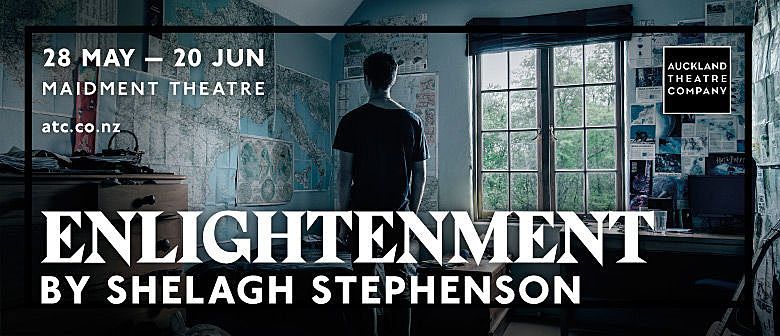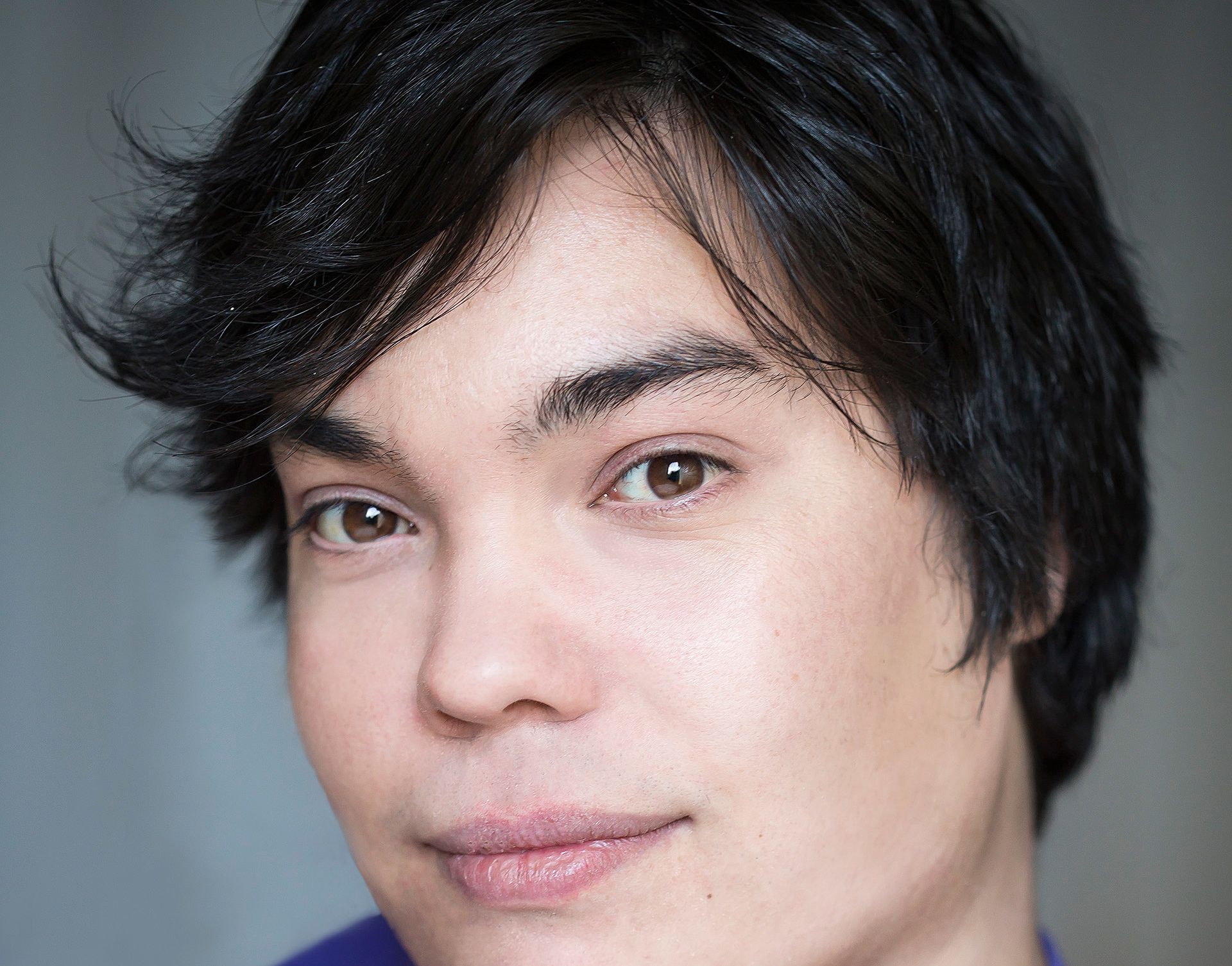Review: Enlightenment
Right play, wrong time, wrong place? Sam Brooks on ATC's new production.
The Auckland Theatre Company can deliver spectacle like nobody else in this country. When they’re on top form, they can draw you into a show om the sheer technical artistry alone. Enlightenment begins with one of those moments; a projection on the screen of someone walking across a theatre foyer (the same foyer that we’ve been waiting in for about twenty or so minutes) is suddenly replaced by a burst of static and then the title of the play, as a thunderous score plays.
It’s a tremendous moment of theatre that nonetheless manages to feel disconnected from the rest of the production. Straight after that, we’re brought into a room where three characters sit around talking. A twenty year old boy has gone missing while backpacking through Bali, the son of Lia (Rachel Nash) and Nick (Stephen Lovatt). It’s been three months. In desparation, Lia has employed a ‘sensitive’ (Catherine Wilkin) to give them any clues as to his whereabouts. The sensitive doesn’t give them any satisfactory answers, and the couple have a drawn-out fight that feels like it could be the last scene of your everyday kitchen-sink, wine-glass-throwing domestic drama.
The disconnection I described at the start continues to be felt throughout the play. The first act and the second act feel like different plays - not immediately a bad thing, but nonetheless jarring. The gorgeous AV design seems at odds with the actual content unfolding on stage, as does the frequently stunning lighting design. Most crucially, the play is at odds with the time and place we are seeing it.
Enlightenment was written in 2005 by Irish playwright Shelagh Stephenson, and whether or not it was intended to be in response to the Bali bombings, the content reflects a post-Bali-bombing society. The First World paranoia of losing a family member in a foreign country,that you could somehow face violence because of the colour of your skin, your wealth and your privilege, is still as strongly felt today as it was then, But the details of this play feel very much a part of 2005’s world.
People still go missing, but it seems unlikely, even given the revelations of the play, that this particular person would go missing in this particular fashion, in a world of Facebook and surveillance. A significant plot thread revolves around using the missing boy’s story for a TV documentary, and putting aside the cartoonish depiction of a TV journalist for conflict’s sake, this puts it squarely in a world that exists before BuzzFeed and Twitter journalism.
The second act stretches the suspension of disbelief enough, with key characters acting in psychologically unbelievable ways to justify the plot and themes, but in localising the play to this time and place, which is barely ten years after the event, it comes off in an awkward place where it’s too recent to be nostalgic, and too old to be current.
Another problem is the language. Shakespeare has a hard enough time when performed in the New Zealand accent - which, of course, is musical in its own right. But when you throw contemporary and defiantly British phrases like ‘Do you fancy me?’ into our accent, it comes off sounding awkward and flat. The musicality of Stephenson’s dialogue, which dips into a stirring theatricality a handful of times throughout the play, is lost in translation. It doesn’t stop the production dead in its tracks - the cast are too good to allow that - but with all of the disconnection already present, it’s just another incongruous element.
The play revolves around Rachel Nash as Lia, and it took me a long while to warm to her performance. Initially, I found her to be an odd fit for the character. Nash seemed too warm and comforting a presence, her voice too soothing and her usual subleties registering less as subtlety and more as underplaying. But as the play continued into the second act, her character develops a backbone and a strength from her confusion that is fascinating to watch. Her final scene is a tour-de-force - a complete inversion of the Lia we saw at the start of the play, but one that we suddenly realise Nash has been teasing us with all along.
Stephen Lovatt is reliably good as Nick, although the script doesn’t give the character a lot of original beats to play, and too often he is pushed into uninteresting reiterations of anger and grief. The script also does David Aston, playing Lia’s father Gordon, no favours, providing him with a narrative-and-insult-device of a character, but he nails all of his laugh lines, and he’s a welcome constant as the play shifts from domestic drama to domestic thriller.
Anna Julienne’s take on Joanna, the cartoonish journalist who is only interested in the story and resembles no journalist anybody has met (let alone any human anybody has ever met), is surprisingly effective and a highlight of the play. Julienne brings her usual charisma and sharpness to Joanna, making her tremendously entertaining and a great foil for the other actors.
Similarly, Catherine Wilkin transcends the script’s stereotypes of what a medium is by layering the character with believable, grounded quirks and a world-weariness that is endlessly appealing. The stage comes alive whenever she returns to it.
Jordan Mooney has the most difficult role in the second half, not only because the character dominates that part of the play, but because of the character’s slow, subtle revelations. There’s a lot of choices for an actor to make within that character, and Mooney’s simple yet understandable choices early on mean that later moments, which could be effective explosions and revelations, come off as comical rather than affecting.
The design elements of the play are largely successful, especially Dan Williams’ set. It puts the audience is a constant state of unease and displacement which mirrors the characters’ without belabouring the point. Paul McLaney’s sound design is stirring and carries the play through its transitions, but occasionally the percussion of the soundtrack sets up a dramatic scene that doesn’t necessarily follow on emotionally from that transition.
For a play that includes costume as a plot point, even multiple plot points, Lisa Holmes’ designs fall short of the rest of the design. The transition of characters from dark clothing into lighter clothing as they pass into ‘enlightenment’ is a little bit too on-the-nose, and sometimes the shifts in costuming are more distracting than they are effective. Beyond that, some individual pieces distract more than they add to character, such as a pair of red wedges that Joanna wears in the second act - the only time red appears in the play, and for no discernable reason I could see. However, Holmes’ choice of a T-shirt for a key plot point is effective. It transmits the play’s themes of displacement on a personal and global level, better than even the text does at times.
Tom Bogdanowicz’s projections are beautiful, but some transitional choices like blue flames or sound bars are bizarre in the context of the play, and the scenes they are transitioning between. Likewise, Brendan Albrey’s designs are striking, but they often don’t draw meaning from the text or lend significance to the production, and his tableaus work most when they’re at their simplest, like in the gorgeous final scene.
Enlightenment is a troubled text, even moreso in this context, performed ten years after its debut in a foreign country and a very different world. The disconnection that is present throughout this production is in the core of the text, especially in its troubled second half. Characters like Joanna and Gordon are devices, their lack of dimension only stretching the thriller aspect of the second half (already fairly low-stakes) even thinner. Brief character notes like Nick’s job as a professor of metaphysics in poetry, or Lia’s biography of a woman who lost her son seem less like organic human qualities and more like the workshopped notes of a fourth or fifth draft, so that when the text drops down from it’s pseudo-intellectual high into the human, it feels manipulative and crude.
It’s a credit to director Andrew Foster, unifying the best of the performers and the designers, that the play is as effective as it is. But there’s too many distractions, too many clashing elements, to Enlightenment to make it cohere as a production. At its best, like Nash’s performance and the opening, it’s an example of the best of what The Auckland Theatre Company can provide. The rest of the time, it’s a reminder that no amount of talent and skill can save a production that just isn’t on at the right time in the right place.
Enlightenment runs at the Maidment Theatre until Saturday, June 20. For tickets and more information, go here.

